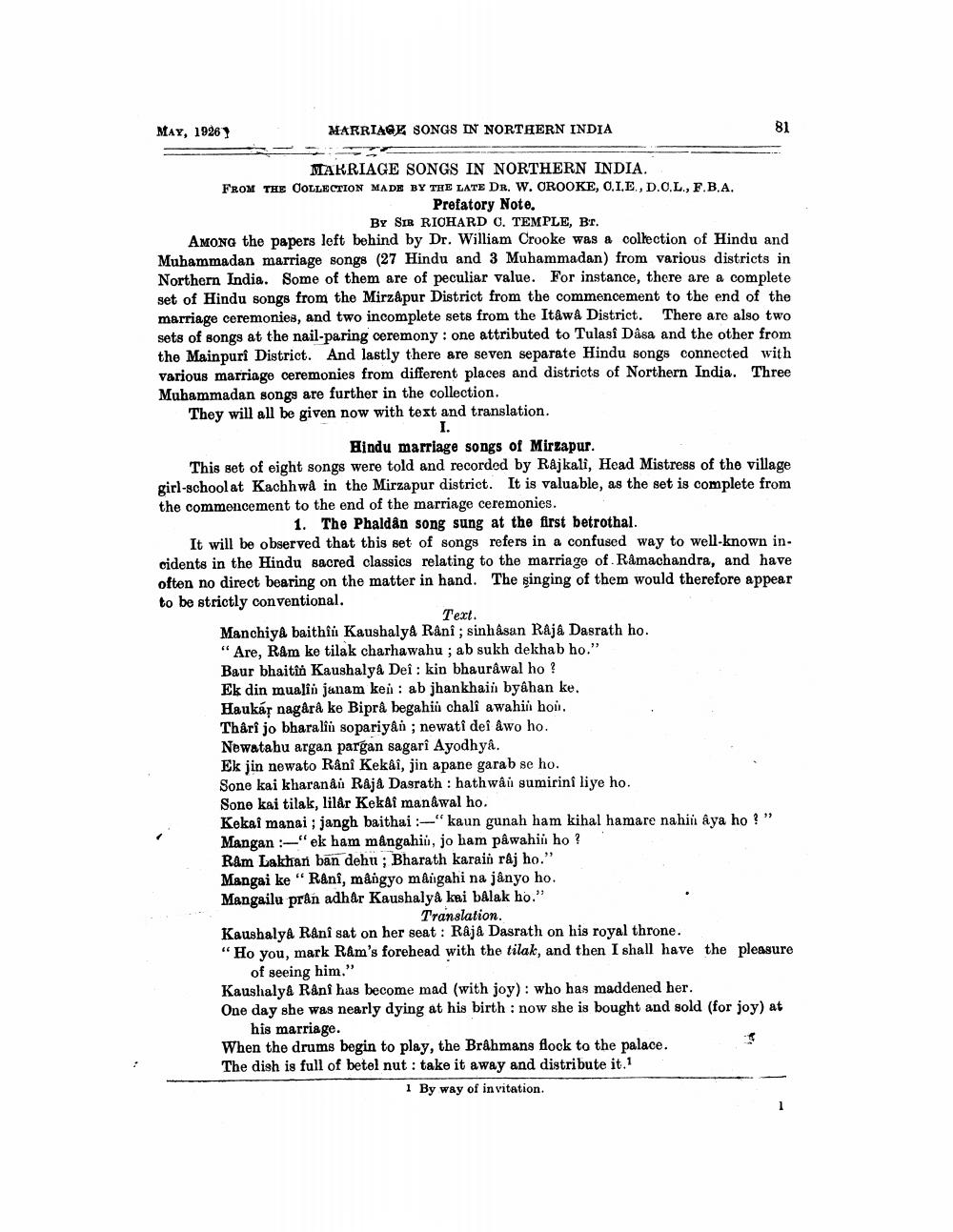________________
MAY, 1926]
MARRIAGE SONGS IN NORTHERN INDIA
MARRIAGE SONGS IN NORTHERN INDIA.
FROM THE COLLECTION MADE BY THE LATE DR. W. CROOKE, C.I.E., D.C.L., F.B.A.
Prefatory Note.
81
BY SIR RICHARD C. TEMPLE, BT.
AMONG the papers left behind by Dr. William Crooke was a collection of Hindu and Muhammadan marriage songs (27 Hindu and 3 Muhammadan) from various districts in Northern India. Some of them are of peculiar value. For instance, there are a complete set of Hindu songs from the Mirzapur District from the commencement to the end of the marriage ceremonies, and two incomplete sets from the Itâwâ District. There are also two sets of songs at the nail-paring ceremony: one attributed to Tulasi Dâsa and the other from the Mainpuri District. And lastly there are seven separate Hindu songs connected with various marriage ceremonies from different places and districts of Northern India. Three Muhammadan songs are further in the collection.
They will all be given now with text and translation.
I.
Hindu marriage songs of Mirzapur.
This set of eight songs were told and recorded by Rajkali, Head Mistress of the village girl-school at Kachhwa in the Mirzapur district. It is valuable, as the set is complete from the commencement to the end of the marriage ceremonies.
1. The Phaldân song sung at the first betrothal.
It will be observed that this set of songs refers in a confused way to well-known incidents in the Hindu sacred classics relating to the marriage of Ramachandra, and have often no direct bearing on the matter in hand. The singing of them would therefore appear to be strictly conventional.
Text.
Manchiya baithi Kaushalya Rânî; sinhasan Raja Dasrath ho. "Are, Ram ke tilak charhawahu; ab sukh dekhab ho." Baur bhaitîn Kaushalyâ Dei: kin bhaurâwal ho? Ek din mualin janam kei: ab jhankhain byâhan ke. Haukar nagara ke Biprâ begahin chali awahi hoi. Thârî jo bharalin sopariyân; newati deî âwo ho. Newatahu argan pargan sagarî Ayodhya.
Ek jin newato Rânî Kekâî, jin apane garab se ho.
Sone kai kharanâu Raja Dasrath: hathwân sumirini liye ho.
Sone kai tilak, lilâr Kekâî manâwal ho.
Kekai manai; jangh baithai :-"kaun gunah ham kihal hamare nahin âya ho? Mangan:-"ek ham mångahiu, jo ham pâwahiù ho? Ram Lakhan ban dehu; Bharath karain râj ho." Mangai ke" Rânî, mangyo mâigahi na jânyo ho. Mangailu pran adhar Kaushalya kai balak ho." Translation.
Kaushalya Rânî sat on her seat: Raja Dasrath on his royal throne.
"Ho you, mark Râm's forehead with the tilak, and then I shall have the pleasure of seeing him."
Kaushalya Rânî has become mad (with joy): who has maddened her.
One day she was nearly dying at his birth: now she is bought and sold (for joy) at
his marriage.
When the drums begin to play, the Brahmans flock to the palace.
The dish is full of betel nut: take it away and distribute it.1
1 By way of invitation.




